

English Pronunciation Exercises (Practice Them to Sound Like a Native Speaker) - EngFluent. Are you looking for practice exercises to improve your English pronunciation? If yes, you’ve come to the right place. This page contains pronunciation exercises organized into 5 chapters: How to Practice the Exercises Improving your English pronunciation is hard. But you can make it easier by focusing on only one pronunciation skill at a time. That’s why the exercises are organized into five chapters. There are a lot of exercises on this page. Chapter 1: The Main Sounds of English In this chapter, you’ll find exercises to help you pronounce every main sound in English correctly.
English has a lot of words that sound similar (heel vs. hill, sell vs. sale, pool vs. pull). In many of the exercises, you’ll be practicing two similar sounds at the same time. The Vowel Sounds English has about 15 main vowel sounds. As a result, you might pronounce two different words the same way because you can’t hear the differences between them. /i/ (heat) and /I/ (hit) /eɪ/ (late) and /ɛ/ (let) Passive forms. We use the passive, rather than the active, to show that we are more interested in a certain part of the sentence.
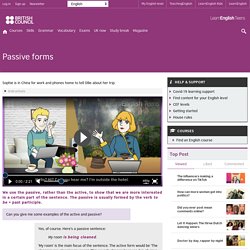
The passive is usually formed by the verb to be + past participle. Can you give me some examples of the active and passive? Yes, of course. Here’s a passive sentence: My room is being cleaned. 'My room' is the main focus of the sentence. OK, that makes sense. We also use the passive when we don’t know who did something, or when it isn’t important. It’s the biggest outdoor elevator in the world, so I’ve been informed. It doesn’t matter who told me. I think loads of films have been made there. The important thing is the films, not the film-makers. Can you use a passive and also say who did the action? Pronouns @ The Internet Grammar of English. Present Simple or Present Continuous? - Exercise 1. Choose the correct form for each verb.
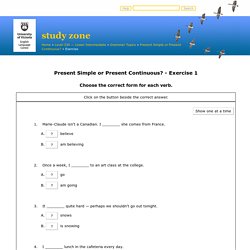
Click on the button beside the correct answer. Marie-Claude isn't a Canadian. I ________ she comes from France. believe am believingOnce a week, I ________ to an art class at the college. go am goingIt ________ quite hard — perhaps we shouldn't go out tonight. snows is snowingI ________ lunch in the cafeteria every day. have am havingSalman is rich — he ________ a Mercedes. drives is drivingDon't give Jan any cheese. She ________ it! Simple Present and Present Continuous Exercise. 'Past Simple & Present Perfect' - English Quiz & Worksheet. Topic: Past Simple | Level: Intermediate Online English Quiz Instructions: Choose the correct verb form to complete the sentences Printable Worksheet Click here for the answer sheet Note: When printed, this page will be formatted correctly for use as a handout. has lived lived haven't seen didn't see left have left has not been was not finalised have finalised hasn't started.
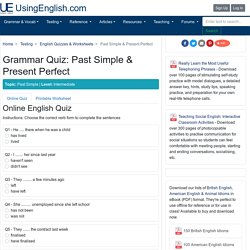
English Study Quiz - Present Perfect or Past Tense (A-4-ESL) Past Simple and Past Continuous Exercise 1. Simple Present vs. Present Progressive - English Grammar. Exercises and tests Form See also explanations on Simple Present and Present Progressive Use In general or right now?
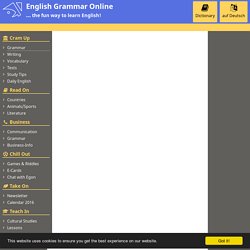
Do you want to express that something happens in general or that something is happening right now? Timetable / Schedule or arrangement? Do you want to express that something is arranged for the near future? Daily routine or just for a limited period of time? Do you want to talk about a daily routine? Certain Verbs The following verbs are usually only used in Simple Present (not in the progressive form). state: be, cost, fit, mean, suitExample: We are on holiday. possession: belong, haveExample: Sam has a cat. senses: feel, hear, see, smell, taste, touchExample: He feels the cold. feelings: hate, hope, like, love, prefer, regret, want, wishExample: Jane loves pizza. brain work: believe, know, think, understandExample: I believe you. 'Present Simple or Progressive' - English Quiz & Worksheet. Topic: Present Simple | Level: Beginner Online English Quiz Instructions: Choose the correct verb form.
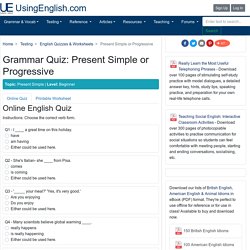
Printable Worksheet Click here for the answer sheet Note: When printed, this page will be formatted correctly for use as a handout. have am having. Exercises – countable and uncountable nouns – some / any.